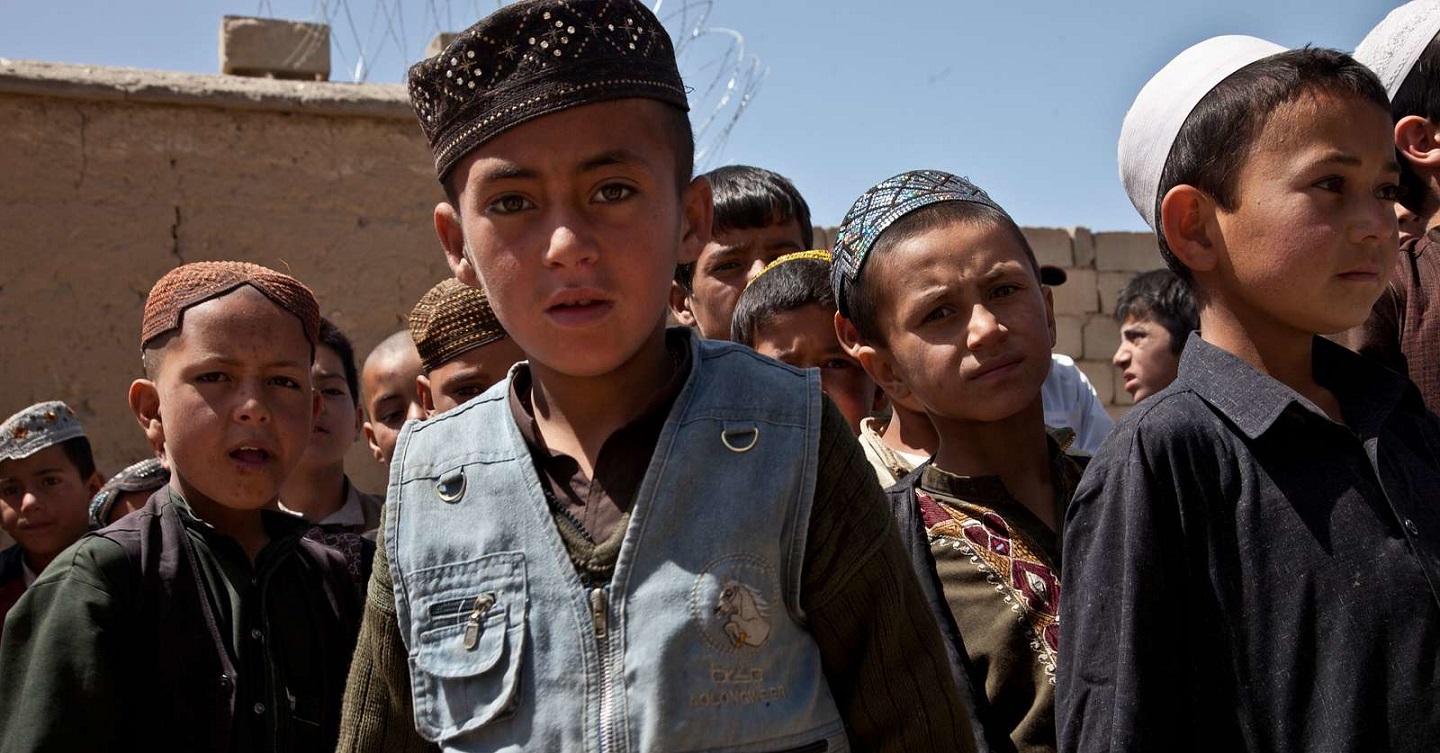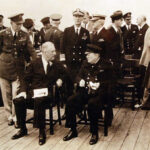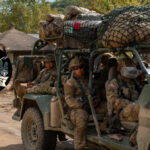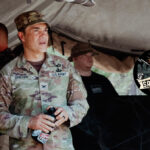
What went wrong in Afghanistan? Did anything go right? We’re definitely not going to thoroughly answer those questions in a thirty eight minute podcast episode, but any answer to those questions should feed the greater question – What can the United States in general and the Army in particular learn from the nation’s experience in Afghanistan? A BETTER PEACE welcomes three members of the Eisenhower Series College Program (ESCP) to share their experiences while deployed to and in support of operations in Afghanistan. Matt Adamczyk, Rob Greiner and Kevin Payne join podcast editor Ron Granieri in the studio to discuss the issues they encountered in conjunction with Operation Enduring Freedom and the subsequent operations in Afghanistan.
What I felt and thought as I looked at this was our interests were being overshadowed by our values.
Podcast: Download
Subscribe: Apple Podcasts | Spotify | Amazon Music | Android | Pandora | iHeartRadio | Blubrry | Podchaser | Podcast Index | TuneIn | Deezer | Youtube Music | RSS | Subscribe to A Better Peace: The War Room Podcast
Matt Adamczyk is a U.S. Army infantry officer of over 20 years of service, husband, father of three great kids, and a horrible (but hopeful) golfer. Following graduation from the War College, the family is excited about their sixth move together and joining 3/1 Armored Brigade Combat Team in Fort Bliss, Texas (Go Bulldogs). He is a graduate of the AY22 Resident Course at the U.S. Army War College.
Rob Greiner is an Army Strategist. Prior to this academic year, Rob was a faculty instructor and deputy director at USAWC’s Basic Strategic Art Program. He has also served as a strategist at Army Headquarters, Department of State, Human Resources Command, and at NATO as lead planner for its mission in Afghanistan. Rob holds degrees from Ohio University and Yale. He is a distinguished graduate of the AY22 Resident Course at the U.S. Army War College and received an award for excellence in research and writing for his graduation thesis, “A Foreseeable Finish: Evaluating Afghanistan Through Clausewitz’ Secondary Trinity.”
Kevin Payne is a Military Police Officer with over 25 years of active duty service in the U.S. Army. His experiences include command at Camp Bucca Iraq and the United States Disciplinary Barracks with key developmental positions at Fort Hood, Texas and staff positions in the pentagon and at the United States army military police school. He has deployed on multiple occasions to Iraq and Afghanistan and in his next assignment he will take command of the 15th MP Brigade and he will be the U.S. Disciplinary Barracks Commandant at Fort Leavenworth, Kansas. He is a graduate of the AY22 Resident Course at the U.S. Army War College.
Ron Granieri is an Associate Professor of History at the U.S. Army War College and the Editor of A BETTER PEACE.
The views expressed in this presentation are those of the speakers and do not necessarily reflect those of the U.S. Army War College, U.S. Army, or Department of Defense.
Photo Description: Afghan boy waits for a backpack at the all-boys Pashtu Abad school in Ghazni district, Ghazni province, Afghanistan, April 20, 2013. Khalilullah Hotak, a member of the Nejat Social Council of Ghazni province, distributed backpacks and desks to the school that teaches over 600 boys. The Nejat Social Council’s goal is to eradicate oppression, corruption, and injustice in coordination with the Afghan government.
Photo Credit: U.S. Army photo by Spc. Jessica Reyna DeBooy





In “TO WHAT END? INTERESTS AND VALUES IN AFGHANISTAN” the guests questions about how do we get the American “people” involved in interests and values has an easy solution: assign a price tag to the war. We need to stop “kicking the can” down to the next generation to pay for our wars. If the war is worth American blood and treasure then let’s buy it, not charge it.
As to the question: “To what end?” That, in fact, is a very easy question to answer today.
Explanation:
One can very easily answer the question “to what end,” today, this, via the grand strategic lens (think “containment” and “roll back”) offered by ALL of the U.S./the West’s contemporary opponents — to wit: our great power and small opponents, our state and non-state actor opponents and even our here at home opponents — ALL OF WHOM can be seen to be resisting, and/or seeking to reverse, such political, economic, social and/or value changes as the U.S./the West, post-the Old Cold War, has sought to achieve throughout the world. (The U.S./the West seeking to achieve these such “revolutionary changes;” this, so as cause the states and societies of the world to become better able to interact with, better able to provide for and better able to benefit from such things as capitalism, globalization and the global economy.)
In this regard, consider the following question and suggested answer:
Q: What “tool” (answer: conservatism/traditional social values, beliefs and institutions) has “resisting/reversing change” leadership in Russia, “resisting/reversing change” leadership in Afghanistan and even “resisting/reversing change” leadership here in the U.S./the West used against the “revolutionary” U.S./the West of late?
A: The exact same “tool” (conservatism/traditional social values, beliefs and institutions) that the U.S./the West used against the “revolutionary” Soviets/communists in the Old Cold War of yesterday.
Re: Afghanistan, etc., note Dr. Robert Egnell’s recognition of at least some aspects of my such “revolutionary v. resistance” thesis above:
“Robert Egnell: Analysts like to talk about ‘indirect approaches’ or ‘limited interventions’, but the question is ‘approaches to what?’ What are we trying to achieve? What is our understanding of the end-state? In a recent article published in Joint Forces Quarterly, I sought to challenge the contemporary understanding of counterinsurgency by arguing that the term itself may lead us to faulty assumptions about nature of the problem, what it is we are trying to do, and how best to achieve it. When we label something a counterinsurgency campaign, it introduces certain assumptions from the past and from the contemporary era about the nature of the conflict. One problem is that counterinsurgency is by its nature conservative, or status-quo oriented – it is about preserving existing political systems, law and order. And that is not what we have been doing in Iraq and Afghanistan. Instead, we have been the revolutionary actors, the ones instigating revolutionary societal changes. Can we still call it counterinsurgency, when we are pushing for so much change?
Dhofar, El Savador and the Philippines are all campaigns driven by fundamentally conservative concerns. When we are looking to Syria right now, it is not just about maintaining order or even the regime, but about larger political change. In Afghanistan and Iraq too, we represented revolutionary change. So, perhaps we should read Mao and Che Guevara instead of Thompson in order to find the appropriate lessons of how to achieve large-scale societal change through limited means? That is what we are after, in the end. And in this coming era, where we are pivoting away from large-scale interventions and state-building projects, but not from our fairly grand political ambitions, it may be worth exploring how insurgents do more with little; how they approach irregular warfare, and reach their objectives indirectly.”
(See the Small Wars Journal article “Learning From Today’s Crisis of Counterinsurgency” — an interview by Octavian Manea of Dr. David H. Ucko and Dr. Robert Egnell.)
Bottom Line Thought — Based on the Above:
When considering “end states,” one must, I suggest, consider the “big picture.”
From a “big picture” perspective, thus, one can very easily see and understand the U.S./the West’s post-Cold War desired “end state” for the world, this, via the “achieve ‘revolutionary change,’ both at home and abroad, in support of capitalism, globalization and the global economy” lens that I provide above.
The fact that our great power and small opponents, our state and non-state actor opponents and even our here at home opponents; the fact that ALL of these such opponents are now using such things as conservatism/traditional social values, beliefs and institutions against us (this, much as we did versus the “revolutionary” Soviets/the Communists in the Old Cold War), this seems to support and confirm my such “big picture” “end state” thesis. As does the fact that certain of these “resisting/reversing change” folks, now, seem to consider themselves as “natural allies” of one another, as described below:
“Compounding it all, Russia’s dictator has achieved all of this while creating sympathy in elements of the Right that mirrors the sympathy the Soviet Union achieved in elements of the Left. In other words, Putin is expanding Russian power and influence while mounting a cultural critique that resonates with some American audiences, casting himself as a defender of Christian civilization against Islam and the godless, decadent West.”
(See the “National Review” item entitled: “How Russia Wins” by David French.)
So what happens if we try to look at “the government, the military and the people” (my view, not necessarily Clausewitz); this, via the “big picture” “end state” lens that I introduce above?
Review: As per my such thesis above, the political objective of the U.S./the West, post-the Old Cold War, came to be to transform the states and societies of the world — to include our own — this, so that same might be made to better interact with, better provide for and better benefit from such things as capitalism, globalization and the global economy.
From that such perspective, as Joseph Schumpeter and Robert Gilpin note below, one’s sworn enemy — routinely, perpetually and, indeed, forever — becomes individuals and groups, and states and societies, who cling to “cultural backwardness” (Schumpeter) and/or to certain “traditional social values, beliefs and institutions” (Gilpin):
Schumpeter: “Where the cultural backwardness of a region makes normal economic intercourse dependent on colonization, it does not matter, assuming free trade, which of the ‘civilized’ nations undertakes the task of colonization.” (See the first paragraph of Joseph Schumpeter’s “State Imperialism and Capitalism.”)
Gilpin: “Capitalism is the most successful wealth-creating economic system that the world has ever known; no other system, as the distinguished economist Joseph Schumpeter pointed out, has benefited ‘the common people’ as much. Capitalism, he observed, creates wealth through advancing continuously to every higher levels of productivity and technological sophistication; this process requires that the ‘old’ be destroyed before the ‘new’ can take over. … This process of ‘creative destruction,’ to use Schumpeter’s term, produces many winners but also many losers, at least in the short term, and poses a serious threat to traditional social values, beliefs, and institutions.” (From the book “The Challenge of the Global Capitalism: The World Economy in the 21st Century,” by Robert Gilpin, see the Introduction.)
Thought:
When 9/11 happens (September 11, 2001) — due to an external threat from people who do not wish to be “transformed” — the interests of U.S./Western governments, militaries and people become aligned — even to the point of trying to deal with the “cultural backwardness” problems of certain Islamic peoples. (Thus, “transformation,” at this time, gets a “boost?”) However,
By the time 1/6 happens (January 6, 2021) — to wit: an internal threat from people who do not wish to be “transformed” — the interests of U.S./Western governments (who had been pushing “transformation” both at home and abroad), their militaries (who are duty-bound to set the example as to and indeed to enforce such “transformations,” both at home and abroad); these such government and military interest come to be at odds with the people clinging to traditional social values, beliefs and institutions — many of whom, as 1/6 indicates, are willing to fight and die rather than be “transformed.” (Thus “transformation” — whether at home or abroad — this now comes to be seen in a more negative, a more costly and, thus, a more realistic light?)
Add to this the knowledge that Russia, etc., are now actively exploiting this such rift — between (a) the government and the military and (b) the “culturally backward” people — then the cost/benefit analysis — re: transformation both at home and abroad — this would seem to have changed dramatically?
In looking at my “big picture” “end state” thesis above (the U.S./the West’s post-Cold War desired “big picture” “end state” for the world, this was/is to achieve necessary “revolutionary” political, economic, social and/or value “change” — both here at home in the U.S./the West and there abroad in places such as Afghanistan — this, in support of such things as capitalism, globalization and the global economy);
In looking at my such “big picture” “end state,” it is important to understand that:
a. This is a — perpetual — “big picture” “end state” that:
b. The West has pursued — perpetually (except during world wars and the Old Cold War?) — since at least the 18th Century.
From that such perspective, of course:
a. The problems (conservatism/traditional social values, beliefs and institutions) that the U.S./the West has had to deal with both at home and abroad when pursuing this such — perpetual — “big picture” “end state;” these, likewise, are:
b. Perpetual problems. (And, thus, problems which we should be very familiar with?):
“All in all, the 1980s and 1990s (and the 2000s and 2010s also; author Muller’s book was written in the year 2000) were a Hayekian moment, when his once untimely liberalism came to be seen as timely. The intensification of market competition, internally and within each nation, created a more innovative and dynamic brand of capitalism. That in turn gave rise to a new chorus of laments that, as we have seen, have recurred since the eighteenth century: Community was breaking down; traditional ways of life were being destroyed; identities were thrown into question; solidarity was being undermined; egoism unleashed; wealth made conspicuous amid new inequality; philistinism was triumphant.” (From the book “The Mind and the Market: Capitalism in Western Thought” by Jerry Z. Muller. From the section therein on Friedrich Hayek.)
Re: overseas countries and back in Joseph Schumpeter’s time, these such “cultural backwardness” problems — that got in the way “normal economic intercourse” (capitalism, globalization and the global economy) — these were dealt with via colonialism:
“Where the cultural backwardness of a region makes normal economic intercourse dependent on colonization, it does not matter, assuming free trade, which of the ‘civilized’ nations undertakes the task of colonization.” (See the first paragraph of Joseph Schumpeter’s “State Imperialism and Capitalism.”)
Once Franklin Delano Roosevelt came on the scene, however, (a) “colonization” (because it did not pay as well and caused revolts?) began to fall out of favor and (b) something new (“transformation”/”nation-building?”) came to be seen as the way to overcome such these “cultural backwardness” problems, which got in the way of capitalism, globalization and the global economy:
“Imperialists don’t realize what they can do, what they can create! They’ve robbed this continent (Africa) of billions, and all because they are too short-sighted to understand that their billions were pennies, compared to the possibilities! Possibilities that must include a better life for the people who inhibit this land.” (See the very beginning quotes at Chapter 5 of Niall Ferguson’s “Colossus: The Rise and Fall of the American Empire.”)
Bottom Line Thought — Based on the Above:
Given the U.S./the West’s exceptional experience with (a) the — perpetual — “big picture” “end state” that the U.S./the West has pursued, both at home and abroad, since at least the 18th Century and (b) the — perpetual — at home and abroad — problems relating thereto;
Given this such enormous experience (over 300 years — since the 18th Century?), why do we seem so surprised and so unable to act and overcome these problems efficiently today?
(Above, re: Joseph Schumpeter, I provided you with a “overseas countries” example of this problem and solution. Here, possibly, is an “at home” example of this problem and solution; in this case, from back in Andrew Jackson’s time:
“Jacksonians drew their support from Northern laborers and yeoman farmers in the South and in the West. These groups, which Jackson dubbed the ‘bone and sinew of America,’ worried that the market economy would force them into the dependent class. The Jacksonians told the farmers and the laborers that they would do everything in their power to prevent this from taking place. In essence, the men and their rank and file voting allies, along with Jackson, fought a rear-guard action against encroaching industrialization and market economy. Although they won the pivotal battles, they lost the war, because their notion of a pre-capitalist agrarian society succumbed to the industrial economy after the Civil War.” [See the ‘Encyclopedia of U.S. Political History’ by Andrew Robertson, et al., and the section therein entitled ‘Jacksonian Democracy,’ Page 194.”] Herein, to note the similarity to [a] former President Trump’s efforts to impede necessary progress today; this, [b] in today’s transition from an industrial to an information economy? Again, we have seen this all before.)
From the work I have done above, might we say that:
a. If one wishes to understand and address such things as desired “end states” — for Afghanistan and/or for the U.S./the West today — such things as “the government, the military and the people” (American and/or Islamic) — and even such things as “corruption” (both here and there)
b. Then one must do this, yesterday as today, from the perspective of the U.S./the West’s over 300 year “revolutionary” effort to:
1. Continually transform/modernize the states and societies of the world — to include our own such states and societies — this:
2. So that same might — continually and neverendingly — be made to better interact with, better provide for and better benefit from such things as capitalism, globalization and the global economy. (America’s civil wars, for example yesterday and today, to be understood from this point of view?)
From this such perspective, of course — and both here at home in the U.S./the West and there abroad in places like Afghanistan — (a) such things as conservatism/traditional social values, beliefs and institutions/cultural backwardness and (b) those that would seek to attain or retain power, influence and control by exploiting same — these folks become the U.S./the West’s both at home and abroad enduring enemies.
Herein, colonialism back-in-the-day, “reconstruction” in the U.S after the Civil War, “nation-building” overseas of late, and even GEN Sir Rupert Smith’s “The Utility of Force” (“the aim of military operations have changed from the pursuit of concrete military strategic objectives to the establishment of certain conditions from which political outcomes can be decided”) — all of these to be understood as methods used — in our “forever wars” — to cause the states and societies of the world (to include our own) to, continually and neverendingly, become better able to interact with, better provide for and better benefit from capitalism, globalization and the global economy.
Thus, it is from the “revolutionary” point of view noted by Dr. Robert Egnell at my “B.C. says: June 14, 2022 at 1:44 pm” comment above that we should view such things as our “forever wars,” etc., — both here at home and there abroad — yesterday as today?
With all due respect, it is not easy for me to understand how the military class, especially the officer class, is so sensitive to its political class’ manipulation. They are used and abused, it seems they don’t know why they fight and even go so far as to fight against what they believe they are defending.
What happened in Afghanistan, despite its high cost and tendency to be quickly forgotten, is but another example of this same incoherent pattern in favor of violence and war.
I can only wait for them to realize the manipulation they have been subjected to so they will wake up and indeed work for a better peace.